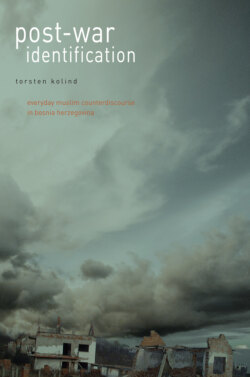Читать книгу Post-War Identification - Torsten Kolind - Страница 40
На сайте Литреса книга снята с продажи.
The destruction of communication
ОглавлениеLamira’s story is somewhat extraordinary, not in content, but in form. It has a chronological order and is coherent. Most Muslim women in Stolac would probably recognise the feelings and situations she depicts, but few would be able to express them so clearly. This brings me to the methodological problem of how to represent the violent memories and experiences of my informants, how to “write about the ‘unmaking’ and ‘creating’ of the world in a ‘made’ world of academic prose?” (Nordstrom 1995: 138). Theory and academic writing style have a structure and order which is removed from lived experience (Hastrup 1988), an order which is imposed on the world, “the academic will to order” as van de Port names it (1998: 25), an order which is especially intolerant of the chaotic experiences related to war, violence and the unmaking of the world. It is therefore unlikely that experience of war and violence can ever be documented in any real sense. Representations of human suffering will always have gaps in terms of experience, perception and the nature of pain itself (Perera 2001: 157-60).
Furthermore, the problem confronts not only anthropologists: it is also central for the victims of war and violence themselves. In essence, the problem is this: how can one communicate experiences when existing categories do not suffice, and when the categories themselves have been distorted by the unprecedented events of war and violence. In addition, victims of violence and terror are also often caught in a dilemma between wanting to forget and wanting to remember at one and the same time. For example, Warren (1993) has described how people in Guatemala did not want to talk about la violencia (a period of intense state violence) because they feared reprisals. At the same time, however, that period came up in all routine conversations, in part because it functioned as a temporal marker in people’s conceptual world. My informants showed the same ambivalence: on the one hand they wanted to speak out, and to put their violent experiences into word to tell the world about them (thereby experiencing the imperfection of words); on the other hand, and at the same time, they wanted to forget, to be able to get on with life and achieve peace of mind.
